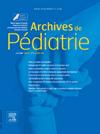胎儿酒精谱系障碍和卫生专业人员的意识综合征:从业者的知识在两个法国地区的比较。
IF 1.3
4区 医学
Q3 PEDIATRICS
引用次数: 0
摘要
背景:胎儿酒精谱系障碍(FASD)是导致非遗传性智力残疾的主要原因。法国的许多保健专业人员已从这一公共卫生主题的初步和持续培训方案中受益。本研究的目的是描述和比较法国两个不同地区的卫生专业人员对FASD的知识,这些地区有卫生预防和信息系统(印度洋(IO))或没有(Nouvelle-Aquitaine (NA))。方法和设置:通过电子邮件或社交网络向IO和NA区域的各种卫生专业人员发送有关围产期、儿童和青少年的免费和匿名电子调查。通过比较每个地区医疗保健专业人员的功能和隶属关系来分析响应。结果:我们获得了来自IO的193条回复,来自NA的265条回复。一方面,79%的医疗保健专业人员报告接受了FASD培训,他们中的大多数人都意识到,母亲的酒精摄入量没有对胎儿无害的阈值。似乎91%的人意识到与FASD诊断相关的认知行为障碍。另一方面,只有19%的人知道母亲的年龄是一个危险因素,只有39%的人知道FAS畸形的三个主要迹象。只有30%的人描述了与诊断相关的神经异常。关于酒精相关的神经发育障碍,30%的人错误地认为生长迟缓和面部畸形是诊断的必要条件。数据分析显示,在没有平台的地区,跨专业知识的可变性更大。虽然各地区之间对FASD的了解程度没有直接的显著差异,但在北美受访者中,只有32%的人报告父亲饮酒是一个风险因素,而在北美受访者中,51%的人已经意识到这一点。结论:本研究指出各地区卫生保健专业人员对FASD知识的异质性。它突出了以适当方式向母亲及其子女提供信息、培训和指导的挑战。建立诊断平台对于针对这一特殊的公共卫生问题提供早期、优化和适应的护理似乎至关重要。本文章由计算机程序翻译,如有差异,请以英文原文为准。
Fetal alcohol spectrum disorder and health professionals’ awareness of the syndrome: A comparison of practitioners’ knowledge in two french regions
Background
Fetal alcohol spectrum disorder (FASD) is the leading cause of non-genetic intellectual disabilities. Many healthcare professionals in France have benefited from initial and continuing training programs on this public health theme. The objective of our study is to describe and compare knowledge of FASD among health professionals in two different french regions with a health prevention and information system (Indian Ocean (IO)) or without (Nouvelle-Aquitaine (NA)).
Methods and Settings
A free and anonymous electronic survey related to perinatality, childhood and adolescence was sent by email or social networks to various health professionals in the IO and NA regions. Responses were analyzed by comparing the function and affiliation of healthcare professionals to each region.
Results
We obtained 193 replies from the IO and 265 replies from NA. On the one hand, 79 % of healthcare professionals reported receiving training on FASD, and most of them were aware that there is no threshold of maternal alcohol intake without risk to the fetus. It appears that 91 % of them are aware of the cognitive-behavioral disorders associated with the diagnosis of FASD. On the other hand, barely 19 % were aware that maternal age is a risk factor, and only 39 % had knowledge of the three cardinal signs of FAS dysmorphia. Only 30 % described a neurological anomaly related to the diagnosis. Regarding alcohol-related neurodevelopmental disorders, 30 % wrongly believed that growth retardation and facial dysmorphia were necessary for diagnosis. Data analysis reveals more variability in inter-professional knowledge in the region without a platform. While there is no direct significant difference between regions regarding knowledge of the FASD, among the NA respondents, only 32 % reported that paternal alcohol consumption was a risk factor, whereas 51 % of the IO respondents were already aware of it.
Conclusion
This study points out the heterogeneity of healthcare professionals' knowledge of FASD within each region. It highlights the challenge of informing, training and orienting mothers and their children in an appropriate manner. The establishment of diagnostic platforms seems essential to provide early, optimised and adapted care in response to this particular public health problem.
求助全文
通过发布文献求助,成功后即可免费获取论文全文。
去求助
来源期刊

Archives De Pediatrie
医学-小儿科
CiteScore
2.80
自引率
5.60%
发文量
106
审稿时长
24.1 weeks
期刊介绍:
Archives de Pédiatrie publishes in English original Research papers, Review articles, Short communications, Practice guidelines, Editorials and Letters in all fields relevant to pediatrics.
Eight issues of Archives de Pédiatrie are released annually, as well as supplementary and special editions to complete these regular issues.
All manuscripts submitted to the journal are subjected to peer review by international experts, and must:
Be written in excellent English, clear and easy to understand, precise and concise;
Bring new, interesting, valid information - and improve clinical care or guide future research;
Be solely the work of the author(s) stated;
Not have been previously published elsewhere and not be under consideration by another journal;
Be in accordance with the journal''s Guide for Authors'' instructions: manuscripts that fail to comply with these rules may be returned to the authors without being reviewed.
Under no circumstances does the journal guarantee publication before the editorial board makes its final decision.
Archives de Pédiatrie is the official publication of the French Society of Pediatrics.
 求助内容:
求助内容: 应助结果提醒方式:
应助结果提醒方式:


